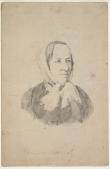Born: Established: 1762 Suffolk,
AustLit
 5833676696886885656.jpg
5833676696886885656.jpg
Margaret Catchpole
Margaret Catchpole
i(A61465 works by)
Born: Established: 1762 Suffolk,
Born: Established: 1762 Suffolk,
c
England,c
c
United Kingdom (UK),c
Western Europe,
Europe,
;
Died:
Ceased:
1819
Richmond,
Hawkesbury area,
Northwest Sydney,
Sydney,
New South Wales,
Gender:
Female
Arrived in Australia:
1801
The material on this page is available to AustLit subscribers. If you are a subscriber or are from a subscribing organisation, please log in to gain full access. To explore options for subscribing to this unique teaching, research, and publishing resource for Australian culture and storytelling, please contact us or find out more.
BiographyHistory
Most Referenced Works
On the Web
Known archival holdings
Local IDs: MS 1116; G 7245; MS 4211; M944
National Library of Australia
(ACT)
State Library of New South Wales State Library of NSW
(NSW)
Last amended 19 Nov 2013 12:46:51

